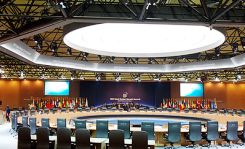By Debak Das* | IDN-InDepth NewsAnalysis
NEW DELHI (IDN) – A year has passed since the last Nuclear Security Summit took place in Seoul in March 2012 and it has been announced that the next summit shall be held in the Netherlands in 2014. What should be the important concerns for the 2014 summit in the Netherlands? What are the important issues that must be taken note of by the Sherpas for the next summit?
Without any ‘actionable’ and binding commitments, the Nuclear Security Summit is a format that is full of rhetoric and offers very little tangible output. Given that the IAEA is also having its meeting on nuclear security in 2013, it makes little sense to continue with a separate multilateral format to discuss nuclear security. Under the aegis of the IAEA (a more democratic forum owing to its greater membership levels), aspects of nuclear security and safety can and will be discussed, thereby leaving deliberations at the Nuclear Security Summit slightly redundant. In order to address this problem, the Nuclear Security Summit process needs to take stock and arrive at an agenda that will keep its existence relevant.
Taking Stock and Looking Forward
The primary focus of the Seoul summit was to build on the agreements and progress that had been made in Washington in 2010 on the issue of safeguarding fissile nuclear material and preventing nuclear terrorism. The minimisation of the use of highly enriched uranium and shifting nuclear use to low enriched uranium was also a focus of the Washington summit that was carried forward in Seoul. The primary outcome of the Seoul Security Summit was the communiqué that came out of it. The problems, though, outweigh the positive outcomes of this summit and are among some of the major issues that need to be considered to make subsequent Nuclear Security Summits successful.
The primary weaknesses of the Seoul summit need to be addressed for there to be any progress at the Netherlands summit of 2014. Firstly, the emphasis on ‘encouraging’ and commitment to ‘strengthening’ unilateral national commitments meant that there was a lack of any binding multilateral commitment for any state. For a nuclear security summit of this stature to not attain any tangible outcomes is a failure that needs to be addressed.
The following are some of the issues that should be on the agenda for Netherlands 2014.
• The Ratification of the 2005 amendment of the Convention on the Physical Protection of Nuclear Material (CPPNM) should be a mandatory multilateral commitment for all the members of the Nuclear Security Summit.
There needs to be a single uniform standard for the securing of nuclear materials and that has to be through the IAEA. The voluntary national commitment format needs to be supplemented with some mandatory binding agreements. The ratification of the CPPNM is the first and basic mandatory commitment that needs to be negotiated.
• Recognition of Iran and North Korea as ‘de facto nuclear states’ and engagement with them on the security of their nuclear materials
Major developments have taken place since the last Nuclear Security Summit. North Korea conducted its third nuclear test in February this year and Iran is ‘at least a year away’ from acquiring nuclear weapons (according to President Obama anyway). In this light, mere condemnation of the two nuclear programmes with little or no new constructive action (as it happened in Seoul), would constitute a failure for the next summit.
In the meanwhile, imposing greater sanctions on the two countries would mean that two nuclear countries shall be extremely hard-pressed economically and hence be incentivised to sell off either nuclear technology or fissile material to any actor willing to pay the right price. For the non-proliferation regime, this constitutes a challenge to its current policy of blanket sanctions and blindness to the fact that these two countries are already nuclear. No amount of denial or coercion can possibly convince Tehran or Pyongyang to roll back their nuclear programmes. It would thus make more sense to accommodate them within a multilateral nuclear security framework ensuring greater accountability of fissile material in these countries.
• Make China a special interlocutor for addressing North Korea and Pakistan
China has a greater role to play in the next Nuclear Security Summit and its potential has hitherto remained unrealised in the earlier summits. The position of leverage Beijing possesses vis-à-vis Pakistan and North Korea, means that its role must be highlighted in this multilateral forum to try and ensure some sort binding contract to allay the fears of nuclear terrorism that may arise from these two countries.
• Arrive at a realistic and achievable timeline for the securing of all vulnerable nuclear materials
In the Netherlands, there needs to be a realistic timeline ‘to secure all vulnerable nuclear materials.’ This goal should have been achieved by 2014 according to the original timeline set at the Washington meeting in 2010. A realistic timeline will help the process attain greater credibility.
• Expand the scope of the agreement to develop ‘low enriched uranium for high powered research reactors
There were specific national commitments to develop ‘low enriched uranium for high powered research reactors’ at Seoul 2012. In the Netherlands in 2014, this needs to be expanded into a uniform, verifiable, multilateral commitment.
*Debak Das is Research Officer at The Institute of Peace and Conflict Studies (IPCS), is the premier South Asian think tank which conducts independent research on issues related to national and South Asian security including nuclear issues, disarmament, non-proliferation, weapons of mass destruction. A version of this article appeared on March 28, 2013 on IPCS website. [IDN-InDepthNews – March 30, 2013]
Picture: 2012 Seoul Nuclear Security Summit Plenary | Credit: Wikimedia Commons
2013 IDN-InDepthNews | Analysis That Matters
Send your comment | Subscribe to IDN newsletter
Follow us on Twitter and Facebook:
http://twitter.com/InDepthNews
http://www.facebook.com/IDN.GoingDeeper

